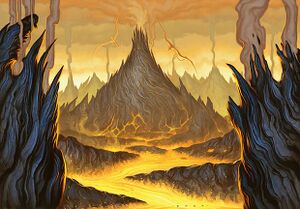Shiv: Difference between revisions
>Hunterofsalvation |
>Hunterofsalvation No edit summary |
||
| Line 10: | Line 10: | ||
* The '''<c>Shivan Gorge</c>''' | * The '''<c>Shivan Gorge</c>''' | ||
* '''<c>Darigaaz's Caldera</c>''' | * '''<c>Darigaaz's Caldera</c>''' | ||
*'''Alric's Landing''', a trading port established by [[Benalia]] | *'''Alric's Landing''', a trading port established by [[Benalia]].<ref name="Dominaria art book">[[James Wyatt]] (2018), ''[[The Art of Magic: The Gathering - Dominaria]]''. [[VIZ Media]].</ref> | ||
==History== | ==History== | ||
Revision as of 06:51, 3 August 2018


The island (or continent) of Shiv is the most powerful source of red mana on Dominaria.[1]
Description
Shiv lies on the northeastern part of the string of continents of which Jamuraa also forms a part. The continents are seperated by the Great Ocean.[2] An inhospitable volcanic landmass, Shiv sits in a deep-ocean "Ring of Fire" which fuels the coastal waters to near boiling point. Only the viashino lizard-folk know the secrets of how to navigate these inhospitable waters, much to the ire of the other Shivans. Shiv is reshaped constantly by geothermal forces, and features a sprawling network of volcanic vents. The swirling clouds of ash and vapor formed by its numerous active volcanoes make the continent visible from miles away. Shiv’s inhabitants include the viashino, goblins, the nomadic Ghitu and of course the Shivan dragons.
Known locations
- The Mana Rig
- Cometia, an oasis located in a meteor crater. [3]
- The Shivan Gorge
- Darigaaz's Caldera
- Alric's Landing, a trading port established by Benalia.[4]
History
Creation myth
According to the Ghitu, Shiv itself hatched from an egg — "a shell of stone around a yolk of flame" — and basked in the heat of primordial Dominaria, shedding its "scales" with each new eruption.[5] The inhabitants of Shiv were born from its elements — the Ghitu were born of the fire, the Dragons of the air, and the Viashino of the earth.
Founding
During the ancient times of the Thran, an outpost of this large empire was located on Shiv, a Mana Rig used to produce powerstones. The structure remained standing for ages after the fall of the Thran. The descendants of the goblin slaves that operated the rig forgot how it was supposed to be used, but created a form of religion surrounding the structure.
Urza
During his studies on Tolaria, Urza discovered an amulet of Thran-steel one of his students, Jhoira of the Ghitu, carried. Hoping to use it in his quest against Phyrexia, Urza traveled to the volcanic island and managed to settle with the viashino living by the Rig by making peace with the dragon Gherridarigaaz, and he managed to persuade the goblins to work with viashino for his cause. From that time on the Rig produced many powerstones for his Legacy.
Invasion
When the Phyrexian Invasion broke out, the Rig was used offensively by Jhoira against the Phyrexians, much to Urza's chagrin; but her old friend, the planeswalker Teferi, had decided he’d rather flee than fight and wanted her to go along with him. Teferi phased out a large chunk of Shiv along with Jhoira and part of the Mana Rig. During this time the Primeval Dragon of Shiv, Rhammidarigaaz, who had been reborn as Gherridarigaaz's son, discovered his origin and started awakening the other dragons.
Rift Era
Shiv suffered horribly after the devastation left in the wake of the Phyrexian Invasion and the drought of mana caused by the time rifts. Teferi successfully managed to return Shiv to its complete and whole form at the expense of his planeswalker's spark. Moggs from Rath were introduced into the Goblin population around 4205 AR, causing some evolutionary changes among the Goblins.
Shivan Nation
Despite being poorly regarded for much of Shiv's history, the Shivan Nation now regards goblins as equals alongside the Ghitu, Dragons, and Viashino.[5]
In-game references
Represented in:
Associated cards:
- Shiv's Embrace
- Shivan Dragon
- Shivan Emissary
- Shivan Fire
- Shivan Harvest
- Shivan Hellkite
- Shivan Meteor
- Shivan Phoenix
- Shivan Raptor
- Shivan Sand-Mage
- Shivan Wumpus
- Shivan Wurm
- Shivan Zombie
- Viashivan Dragon
Referred to:
- Acidic Soil
- Template:Cardlink
- Dromosaur
- Electryte
- Falter
- Fire Ants
- Radiating Lightning
- Rorix Bladewing
- Scald
- Scoria Wurm
- Seismic Shift
- Template:Cardlink
- Turf Wound
- Template:Cardlink
- Vicious Kavu
- Template:Cardlink
- Template:Cardlink
References
- ↑ Template:NewRef
- ↑ Template:NewRef
- ↑ Brian M. Thomsen (2001) Because of a Twig, in: The Dragons of Magic
- ↑ James Wyatt (2018), The Art of Magic: The Gathering - Dominaria. VIZ Media.
- ↑ a b c Template:NewRef